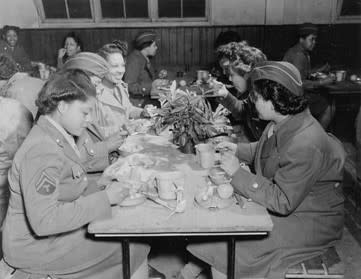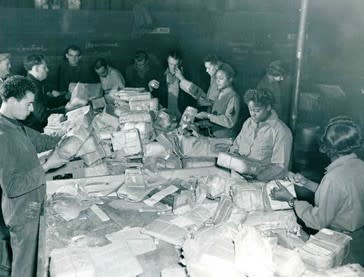October is the time of the year where we celebrate Black History Month. Through this period, we get the chance to hear and learn many different stories. Also, it is a fantastic opportunity to know and pay our respects to the men and women behind those stories. In this article, I bring you a part of history where the protagonists are 800 black women. All of them were part of the 6888th Central Postal Directory Battalion of the US Army. Their mission? To sort out the mail for the Allies troops in Europe during World War II.
The seed of the 6888th Battalion, or The Six Triple Eight, was planted by a single woman. Her name was Charity Adams. She joined the Women’s Army Auxiliary Corps of the US Army in mid-1942, being the first Black female to be commissioned in this force. Two years later, she was in charge of preparing 4 companies for combat at a training centre in Georgia. By that time, Adams held the rank of captain which was a massive achievement. Although key figures like Eleanor Roosevelt and Mary McLeod Bethune advocated during years for the admittance of black personnel in the US Army, segregation prevailed.
It was not until 1945 when the women from the 6888th Battalion would have the chance to make history. On February 3, 800 female soldiers embarked the SS Ile de France and set course for Europe. Ahead of them, there was an 11-day journey across the Atlantic Ocean where their boat had to avoid the much-feared German submarines. The battalion arrived in Glasgow, where it was met by Major Charity Adams, and then travelled from Scotland to the city of Birmingham by train.

Members of the 6888th Battalion during their mission in Birmingham. Source: National Archives
It was here where its mission started. The Six Triple Eight was commissioned to sort out over 17 million undelivered parcels and letters to military personnel through Europe. All this accumulation of mail was piled up without any organization in warehouses scattered across Birmingham. The battalion was assigned just six months to complete this task.
If this assignment was not hard enough, the women from the 6888th had to face a pretty daunting environment at arrival. Birmingham was one of the most bombed cities in England during World War II due to its industrial importance for the war effort. The Six Triple Eight found a landscape full of demolished buildings and streets scarred with bomb craters. But that was not all. The troops were accommodated in King Edward’s School (Edgbaston) which, back in the day, had no heat and its windows were covered by black paint to avoid being targeted by the Luftwaffe (the German air force).
However, the 6888th made no excuses. The 800 soldiers worked 8-hour shifts, seven days a week. In each shift, they handled around 65000 packages thanks to the sorting system The Six Triple Eight implemented. Also, in order to boost their motivation in the busiest periods of working, the battalion embraced “No mail, low morale” as their motto.
During their stay in Birmingham, the women of the battalion settled in pretty well. Despite having a curfew, they were welcomed in public spaces. In addition, it was usual to see them dancing, bowling, or eating at local restaurants. Also, some of the soldiers were invited by Brummies into their houses to have tea and even enjoy Sunday dinners.
Though the battalion was given 6 months to complete this massive task, they did it in 3. After their success in Birmingham, and following the surrender of Germany, the 800 soldiers were transferred to France. Here, they carried out more mail sorting operations. In the French city of Rouen, the division marched in a parade honouring Joan of Arc at the place where she was executed at the stake in 1431.

The Six Triple Eight sorting mail out in France. Source: National Archives
The legacy of The Six Triple Eight is nearly endless. Through their work, they delivered not just letters and packages but hope, love, and memories. Particularly for those fighting in the frontlines, what those million pieces of mail carried inside meant everything. In fact, thanks to the more than 800 heroines that were part of the 6888th, the horrors of war were mitigated for many families. By completing their mission, they helped reuniting people and made possible that life went on. Also, for those who lost loved ones in the conflict, receiving their last letter may have provided some comfort through their grief.
These lines are my particular tribute to the brave soldiers of The Six Triple Eight and my appreciation for the hard work they did, especially in Birmingham, during a bleak time where joy was hard to find. Here is to Charity Adams, Millie Dum Veasey, Elizabeth Johnson, Lydia “Chino” Thornton, Delores Ruddock, and the rest of the battalion. Thank you.
